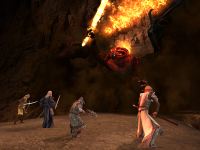| |
Site Navigation
Main
News
Forums
Games
Games Database
Top 100
Release List
Support Files
Features
Reviews
Previews
Interviews
Editorials
Diaries
Misc
Download
Gallery
Music
Screenshots
Videos
Miscellaneous
Staff Members
Privacy Statement
|
|
The second part of the Online Worrlds Roundtable #3 is online now at RPGVault. This is the question they pose:
How important is storytelling in persistent state worlds, how does it differ from standalone games, and what are the keys to doing it effectively? What are the primary challenges to be overcome and the main pitfalls to be avoided? To what extent is it feasible to implement a story in which all the players can feel like they matter, or is providing a sandbox in which players can create their own small, personal and group stories the best that can be done? This is how David Cohen Corval, President of Nevrax, makers of Ryzom, starts his answer:
Storytelling is as important in persistent worlds as it is for other types of games. Gaming is about actions. Actions need to refer to the context of a story to be meaningful, but in the end, they prevail over the story itself. So what are the roles of a story in a game?
- Contribute to the building of emotions.
- Provide a spectrum for the actions of our audience.
- Give meaning to the action.
- And provide the audience with an explanation of the game's universe.
How does it differ from standalone games?
In any more narrative type of game, there is a very limited number of heroes contributing to the story. In a persistent state world, there are thousands of actors, and even more actions impacting the storyline. |
|
|





 Online Worlds Roundtable #3, pt. 2 at RPGVault
Online Worlds Roundtable #3, pt. 2 at RPGVault